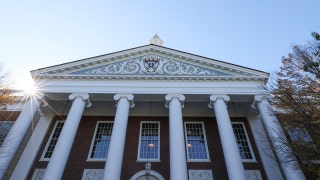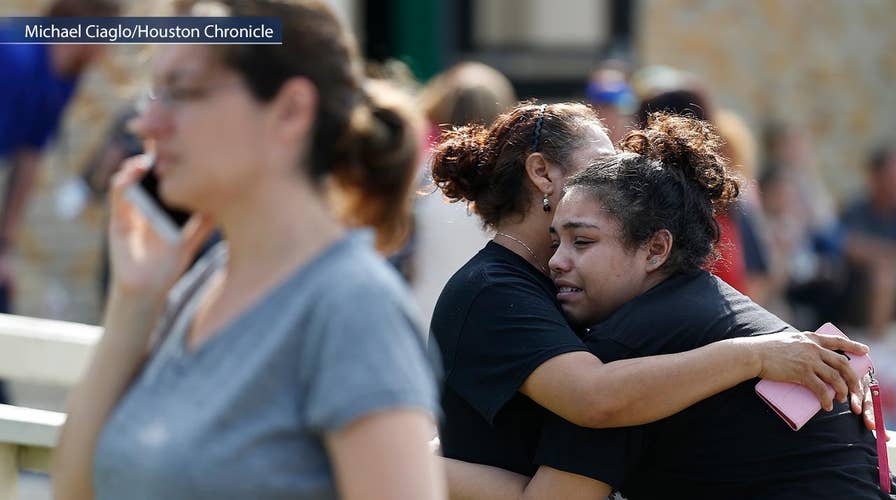Gunman in custody after school shooting at Texas high school
Witness describes chaos at Sante Fe High School.
When a national tragedy strikes, “thoughts and prayers” are most certain to follow, with scores of shocked and saddened Americans taking to social media to appeal to the Almighty.
But just as calls for prayer are inevitable, so are claims from skeptics that peoples’ invocations are flat-out worthless. In the wake of Friday’s tragic shooting at Santa Fe High School, my own calls on social media for prayer were returned with claims that invoking God is “pointless” and that gun control is the only solution to our woes.
In a culture that is becoming increasingly secular — something I cover in-depth in by book, “Fault Line: How a Seismic Shift in Culture Is Threatening Free Speech and Shaping the Next Generation” — these responses and their derivatives expose a painful reality: far too many people lack a basic understanding of what prayer is and why people choose to engage in it.
We’re living in a world in which “everything is political” and, as a result, it seems “nothing is sacred.” And, sadly, the bizarre assault on well-wishers who offer “thoughts and prayers” appears to be gaining steam.
People are certainly free to debate gun control and the merits of various firearms proposals, but dismissive and caustic claims about prayer are problematic on a number of levels.
Aside from the fact that Christians believe prayer is a powerful tool that connects human beings to the Almighty, the invocations that people offer up after painful tragedies aren’t about preventative measures.
When horrors strike, people turn to prayer in a heartfelt effort to ask God to comfort the afflicted, to be with the first responders who are forced to face the unthinkable, to comfort the families who have lost their loved ones and to encourage our culture to come to its sense.
People seek a supernatural peace for those afflicted, urging God to provide blanketing and comfort to people in their most desperate times of need. Prayer isn’t a lazy activity that people rely on in place of taking action.
Most people, in fact, believe that prayer and educated action go hand-in-hand. Actress Candace Cameron Bure said something during an interview with me last year that truly resonated:
“It bothers me and I feel sad for the people who [dismiss prayer], because the first thing I think is, ‘Well, they’ve never experienced the power of prayer. They just don’t know.’ Prayer, for me, is always where you start. That’s the start of your solution. Then, yes, you take action.”
But don’t just take Candace’s word for it. In the Bible, James 2:17 proclaims, “Faith by itself, if it is not accompanied by action, is dead.” The problem isn’t that critics are calling for action, it’s that they have completely skipped over the necessity of faith and the power of prayer to sustain victims and to help those who have been tragically impacted by these horrors.
And as we, as a society, continuously experience the exacerbating rot of cultural decay — or, at the least, rabid, individualized moral decay — manifesting itself in horrific shootings, terror attacks, social chaos and other related events and ills, faith and prayer are perhaps more desperately needed in the modern era than ever before.
“Action” should be discussed and debated and all sides should come to the table to take part in figuring out solutions, but prayer — which has gotten a bad rap in some circles — should always be the starting point.
The Bible is filled with proclamations about the importance of conversing with God. Philippians 4:6-7 tells us, “Do not be anxious about anything, but in every situation, by prayer and petition, with thanksgiving, present your requests to God.” Jeremiah 29:12 adds, “Then you will call on me and come and pray to me, and I will listen to you.” James, too, tells us to pray and be healed.
And while 2 Chronicles 7:14 spoke directly about Israel, its words offer up some important and timeless lessons: “If My people, who are called by My name, will humble themselves and pray, and seek My face and turn from their wicked ways, then I will hear from heaven, and will forgive their sin and will heal their land.”
With all that said, I get it; not everyone believes in the Bible and prayer, but for those who know the importance of communing with God, we’re faced with an uncomfortable reality: just as a son’s or daughter’s relationship deteriorates with a mother or father if he or she fails to check in and be relational, so does our connection with God.
As I illustrate in my book, “Fault Line,” we’re living in a culture that is increasingly disconnecting from God — and ongoing attacks on prayer simply highlight that definitive reality. Prayer helps shape us, refine us and unite us under God, creating the fruits necessary for personal, cultural and societal health.
For those reasons, alone, prayer matters and is arguably as important as any other remedy. At the least, critics should take the time to understand the true purposes of prayer and, regardless of where they stand on its merits, appreciate the love and care being offered when the faithful ask God to comfort the afflicted.








































